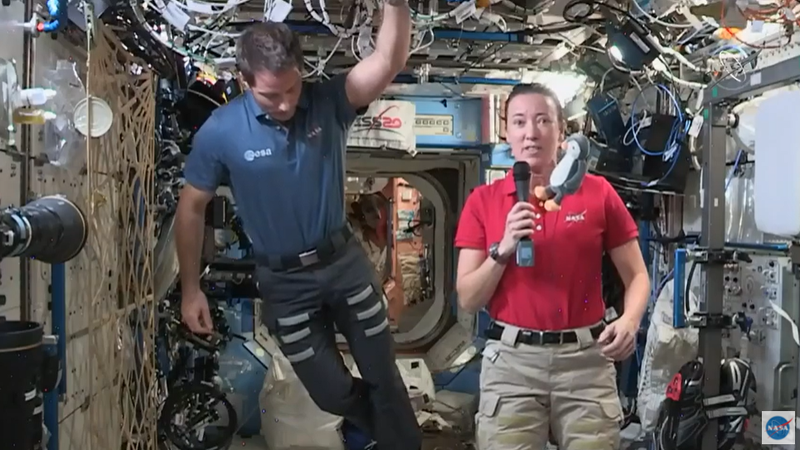
PHILADELPHIA (KYW Newsradio) — Astronauts aboard the International Space Station turned their attention away from Mission Control on Tuesday to answer questions from suburban Philadelphia schoolkids.
NASA astronaut Megan McArthur and Thomas Pesquet from the European Space Agency floated in microgravity as they fielded questions from students in Chester, Bucks and Berks counties 250 miles below. The Q&A was hosted by U.S. Rep. Chrissy Houlahan from Pennsylvania’s 6th District.
Zach, a student at Nottingham Elementary School in Oxford, asked, “How do you know if it is day or night in space?”
“There’s a couple of different ways that we know if it’s day or night,” responded McArthur. “One would be to look out the windows. But you can see, we don’t have a lot of windows in our working area. We actually have a window that’s right here in the floor but it’s covered up right now.”
Another way, she said, was to look at a computer map that shows where the space station is in relation to the time zones of the Earth.
Josie, a student from Immaculate Conception Academy in Douglassville, wanted to know, “How does the change of gravity affect your health?”
“There’s a fluid shift toward the upper side of your body because you don’t have the weight of gravity to pull down the fluids to your legs, so your blood and all of your fluids get to your brain,” Pesquet said.
Astronauts work out for two hours a day to battle muscle loss.
“My question is, how big is the Space Station?” asked Valery, a student at Schuylkill Elementary School in Phoenixville.
“It’s actually pretty big,” Pesquet said. “It’s as big as a football field. There’s 14 modules.”
Maiya, a student at Octorara Elementary School, was curious about condiments in space: “Is it true that salt and pepper are liquified to prevent inhalation and clogging of the vents and damaging the spaceship?”
McArthur told Maiya she was correct. “This is a bottle of liquid salt and this is liquid pepper,” she showed them, “so we can still add some flavoring to our food and it doesn’t make a big giant mess by getting little particles all over the place.”
Sarah from Oxford Area High School asked, “Do cellphones work in space?”
“We don’t use cellphones in space but we do have an internet protocol phone that allows us to make phone calls,” McArthur said.
Frances from the Neshaminy Virtual Academy asked McArthur if there was anything she learned in elementary school that helped her become an astronaut.
“You need to be able to take care of your group of friends and work well together,” McArthur said. “Be a good listener and be a good friend. That’s a really important skill when you’re an astronaut, and that starts in elementary school.”
LISTEN on the Audacy App
Sign Up and Follow Audacy
Facebook | Twitter | Instagram